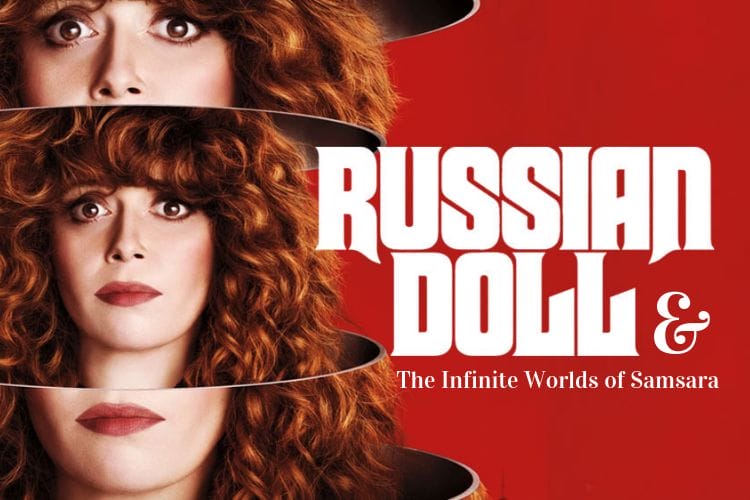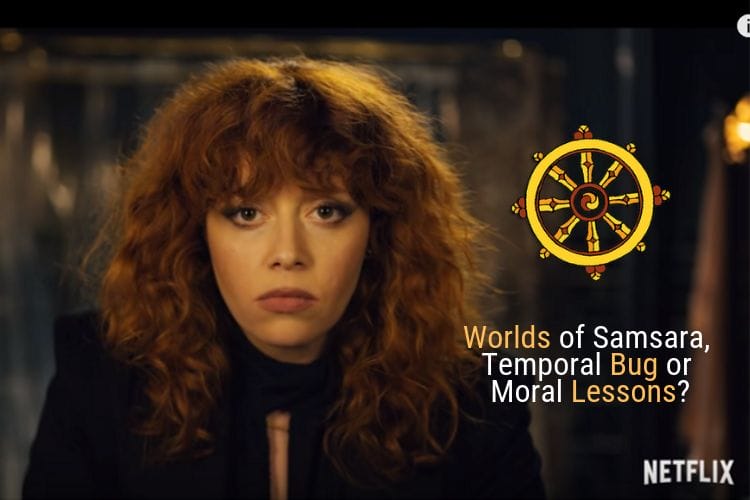Russian Doll and The Infinite Worlds of Samsara

The new Netflix series, Russian Doll, is a primer for the concept of Samsara.
Russian Doll: Worlds of Samsara, Temporal Bug or Moral lessons?
Conventional wisdom teaches us that the one certainty we have in life is that one day we will be dead. But our modern society certainly presents us with strategies and Technological tools to minimize the inevitable fact.
Samsara, Timelines and Social Media Platforms
Like In the worlds of Samsara, there are multiple worlds and bubbles from Social Networks platforms, and we observe the old Individualistic approach as a practical way of living. This way, we tend to forget that the world is a bigger place interconnected and lively; a place where our own actions have consequences.
An affluent modern life, with timelines replete with postings, selfies, and quick and superficial comments, create a strange illusion of immortality: the feeling of eternally present at all times.
This is the underlying theme of the new Netflix series “Russian Doll” (2019-) where the protagonist Nadia (Natasha Lyonne) just like in the classic movie “Groundhog Day,” gets stuck in a time loop.
Nadia is a game designer and computer programmer. She is celebrating her 36th birthday at a busy party hosted by her friend Maxine (Greta Lee). Suspicious and always cynical, the lonely Nadia lives a hedonistic life of sex, alcohol and many cigarettes.
After leaving the party accompanied by a casual sex partner, Nadia goes in search of her lost cat. Crossing a street without looking to the side, Nadia is run over by a car and dies. Just to wake up in the bathroom of the party apartment, in front of the same mirror as guests knock on the door.
Russian Doll: A Millenial Storytelling
In this series, we experience the same theme of protagonists trapped in time, but in a more existential perspective. Two millennial young adults will be imprisoned in the very literalness of the eternal gift that marks the mentality of this generation – trapped in the temporal loop whose death in each cycle only returns to a scene of the same day: the birthday party and disillusionment of love.
The similitude to “Groundhog Day” ends here: instead of using her newly found eternal life (Nadia will die successive times, always waking up in front of the same mirror to the song “Gotta Get Up” by Harry Nilson) she becomes a kind of private investigator determined to find the key event that triggered her temporal loop.
This postmodern notion of time, clearly inspired by the hypertexts of Social networks, results in a marked need to reflect upon the ethical or moral responsibility of our actions and choices.
If each one of our action or choice creates an alternative time/space, we have therefore the exponential effect on our common reality. Since time is no longer linear, but now recursive, viral or exponential, every small decision can produce catastrophic effects in successive parallel time/space. This is something to think about.
Is the Time Loop a Program Bug or a Moral Lesson?
As a game developer, Nadia believes that everything can be explained in the same way as a bug in a game script – the program must be run successively until the algorithm line is found to be defective.
How to explain the mystery? It is just a bug in the algorithmic lines that compose Time programming, or a moral lesson she will be forced to understand?
The birthday girl will have to make a detective journey into her own life to try to piece together the fragments of lost love and loss into a life that had been an extended self-indulgent present.
In an introspective journey, the narrative explores the Gnostic archetype of the Seeker – the protagonists will not only find that remembering what has been forgotten is the only way to get rid of the vicious cycle of death-return, but also a Freudian truth: fear not death, but loneliness.
Russian Dolls is a millennial tale (a generation connected and globalized by the Internet) may be the best technologically equipped to forget about this agreement that underlies our existence: it has created a new form of individualism based on the virtual bubbles we build in digital interactive networks.
This simple premise (having to die to be reborn) gives the Russian Doll unusual black humor – the deaths are always rather comical.
Is Reality itself a time-space anomaly?
The character of Rustin Cohle from the HBO series True Detective used to say, “Time is a flat circle. Everything we have done or will do we will do over and over and over again- forever.”
This is a Nietzsche’s Doctrine of Eternal Recurrence, as depicted in The Gay Science and Thus Spoke Zarathustra. Eternal Return (also known as eternal recurrence) is a theory that the universe and all existence and energy has been recurring, and will continue to recur, in a self-similar form an infinite number of times across infinite time or space.
In The Series Russian Doll the more loops Nadia experiences, the more she begins to remember the past not only to avoid situations that have led to death in previous cycles, but there are hilarious sequences in which she avoids certain stairs to avoid breaking her neck, just as in previous times.
Nadia also begins to remember her family traumas in childhood, making it clear to the viewer that, just like a Russian doll, behind the various layers lies something dark and horrible.
In Groundhog Day Bill Murray was dealing with an eminently moral theme (the inner reformation necessary for Bill to become a better person so Time would move forward again). Here in Russian Doll, the approach is much more ontological and existential. There is something structural in that loop that is independent of any ethical or moral judgments. That’s why the series confronts Allen and Nadia, two completely opposite characters.
Each Russian doll is unaware of the existence of the others, even though they are embedded within each other, just as the solution of the mystery is placed: remembering and the role of memory are both the key-pieces in the narrative puzzle.
The Infinite Worlds of Samsara
In this way, the Russian Doll series enters the eminently Gnostic field: the apprehension of successive cycles of birth/death/ reincarnation is maintained through ignorance and forgetfulness. Remembrance and memory are key to not falling into the same mistakes of previous cycles.
In Buddhism, Samsara is the “suffering-laden, continuous cycle of life, death, and rebirth, without beginning or end. Samsara is perpetuated by karma. Karma or ‘action’ results from an intentional physical or mental activity, which causes a future consequence.
Individualism is one of the traps that bind us to the Buddhist wheel of Samsara. Karma is not automatically burned by suffering. We need something else, as the series suggests: if we are all partners in this temporal cell, we must help each other find our way Home.
You will also enjoy Franz Kafka and The Traveling Doll
About the Author
Creatrix from Sirius. Fairly Odd Mother of Saints (Bernards). Fish Tank aficionado by day ninja by night. Liane is also the Editor-in-Chief of OMTimes Magazine, Co-Founder of Humanity Healing International and Humanity Healing Network, and a Board Member of Saint Lazarus Relief Fund.
Creatrix from Sirius. Fairly Odd Mother of Saints (Bernards). Fish Tank aficionado by day ninja by night. Liane is also the Editor-in-Chief of OMTimes Magazine, Co-Founder of Humanity Healing International and Humanity Healing Network, and a Board Member of Saint Lazarus Relief Fund.





